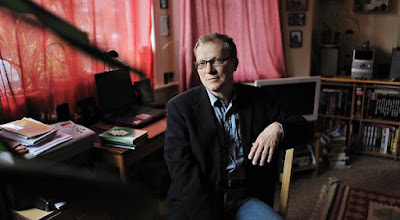We shall do a proper review of this most interesting book,
but first, let's look at some of the things Mr. Lachman has been saying in
various interviews:
http://www.newdawnmagazine.com/articles/the-inscrutable-madame-blavatsky-an-interview-with-gary-lachman
As I argue in the
book, HPB was a seminal influence on practically the whole of modern
spirituality and esotericism.
Well,
the Theosophical Society, in its many different forms, continues today. Much of
what we think of as New Age really has its roots in Blavatsky’s early work.
Tibetan and Mahayana Buddhism, as we understand it in the West, for example,
emerged from her and her early followers. W.Y. Evans-Wentz, who collected the
funerary texts we know as The Tibetan Book of the Dead, was a
Theosophist, and much of his work is informed by Theosophical ideas. Also, our
contemporary interfaith and multifaith sensibilities, our striving toward a
broad religious tolerance, has its roots in Blavatsky’s belief that all the
major religions have their source in an ancient, ‘secret’ doctrine. She was
very much ahead of her time.
One reason is that Isis Unveiled is often overlooked compared to her other major work. I think it is a remarkable achievement. It is one of the first occult compendiums, a fascinating, if often exhausting, collection of what esoteric and occult literature and philosophy was available at the time. It is the source of so much of what we see as ‘alternative’ literature today. … Basically, with Isis Unveiled Blavatsky tried to resurrect the Hermetic wisdom, which had been in eclipse since the 1600s. If nothing else she deserves credit for formulating the first philosophical – not religious – criticism of Darwinian evolution in it;
http://www.patheos.com/blogs/panmankey/2014/05/20-questions-with-gary-lachman/
I think people think they know who and what HPB was about already, and accept the cliches and stereotypes about her, without really looking into who she actually was. She’s as important in the shaping of the modern world as Darwin, Marx or Freud, but the myths and half-truths that have been repeated over and over prevent us from seeing this. My book tries to redress this misunderstanding.
http://www.readthespirit.com/explore/madame-hp-blavatsky-dawn-of-interfaith-exploration/
Blavatsky
is a catalyst who comes into people’s lives and stirs up things. Olcott
probably woundn’t have gone to india on his own, for example, but Blavatsky
gets him to go to India and the Theosophist movement goes to India with them.
Blavatsky’s message is this very positive forward-looking view of the
progression of humanity out of slavery in the past into freedom. Even people
like Thomas Edison took some ideas from Theosophy. People like Edison weren’t
signed up to the full Theosophist creed, but they were attracted to some of the
new ideas.
If
you peel away all of the layers in Blavatsky’s life, you discover this
real-life character who was influential in building our multifaith sensibility
today and who promoted this whole idea of a universal pursuit of truth that
should be open to everyone. She really was a liberationist. She’s was on the
barricades fighting for what she saw as the best in the modern world.
Although
she died more than a century ago, Blavatsky’s name still turns up in serious
discussions about “ancient wisdom,” “secret teachings,” and “inner knowledge,”
and it is generally agreed that her Theosophical Society, which she founded in
New York in 1875, with her colleagues Henry Steel Olcott and William Quan
Judge, was more or less the officialtarting point of the modern spiritual
revival. By “modern spiritual revival,” I mean our contemporary widespread
interest in a direct, immediate knowledge and experience of spiritual reality,
and in a more profound relationship to the cosmos than traditional religions
and mainstream science can provide.
In fact, as early as 1970, in an article for McCall’s magazine, the novelist Kurt Vonnegut dubbed Blavatsky “the Founding Mother of the Occult in America.”
To press my point: Anyone who meditates, or considers himself a Buddhist, or is interested in reincarnation, or has thought about karma, or pursues “higher consciousness,” or has wondered about Atlantis, or thinks the ancients might have known a few things that we don’t, or reads about esotericism, or who frequents an “alternative” health center or food shop, would be aware of it if modern spirituality somehow became “HPB free.”
varia:
March against genocide - Saturday, May 3 begins at Westmount Park 2:30pm
http://genocidecentennial.ca/event/march-for-unity-for-genocide-prevention/




